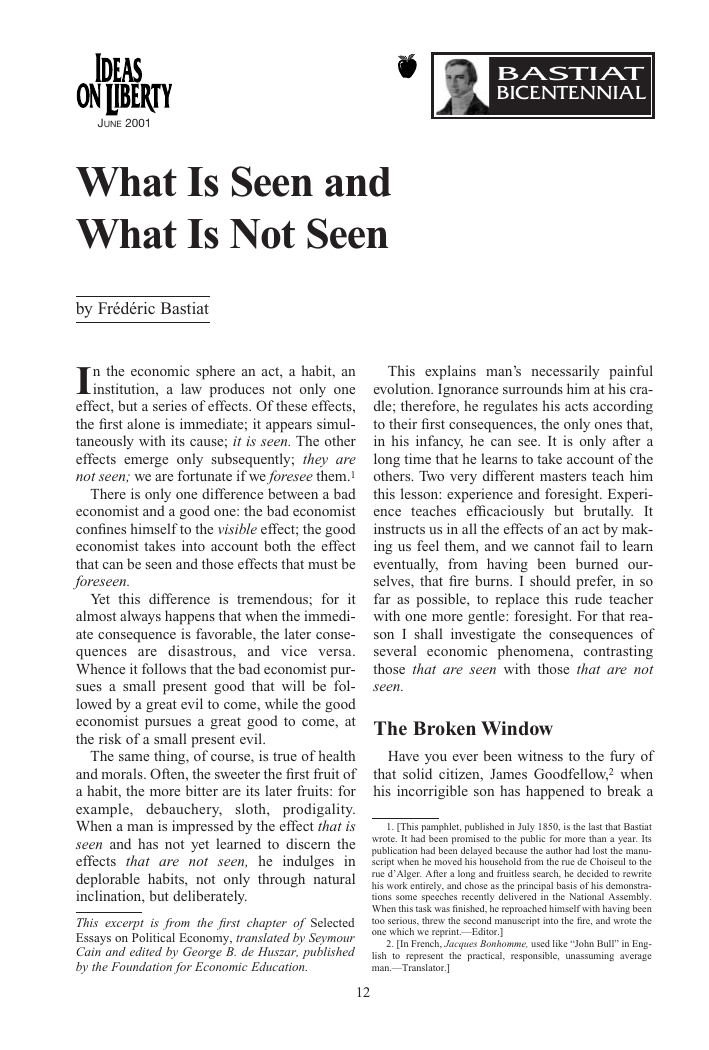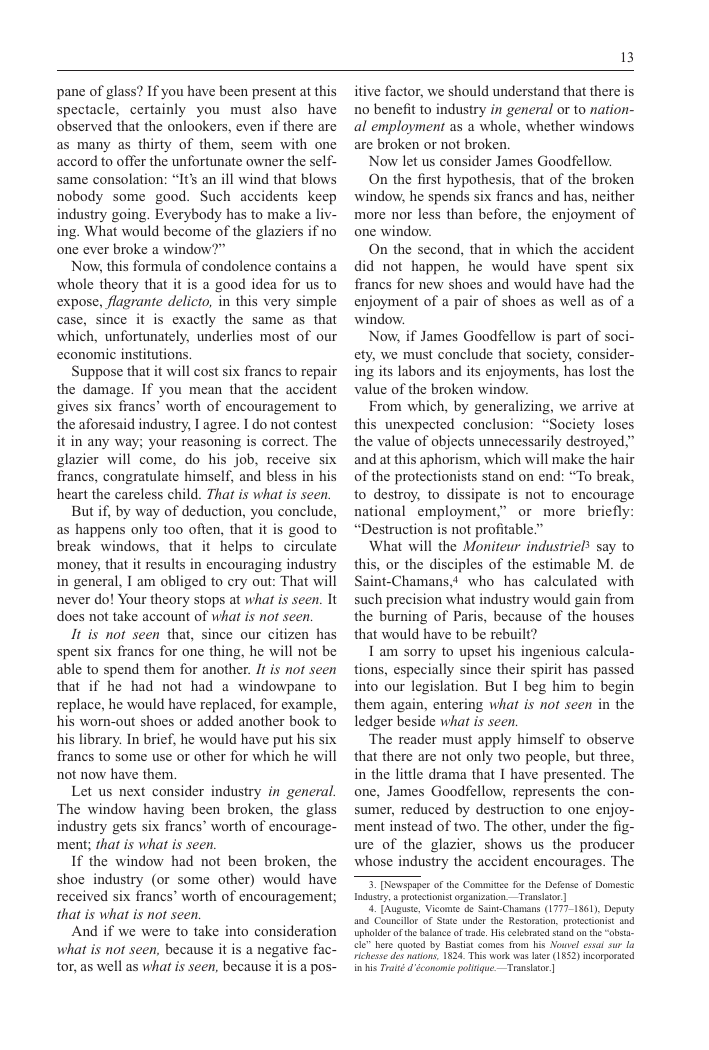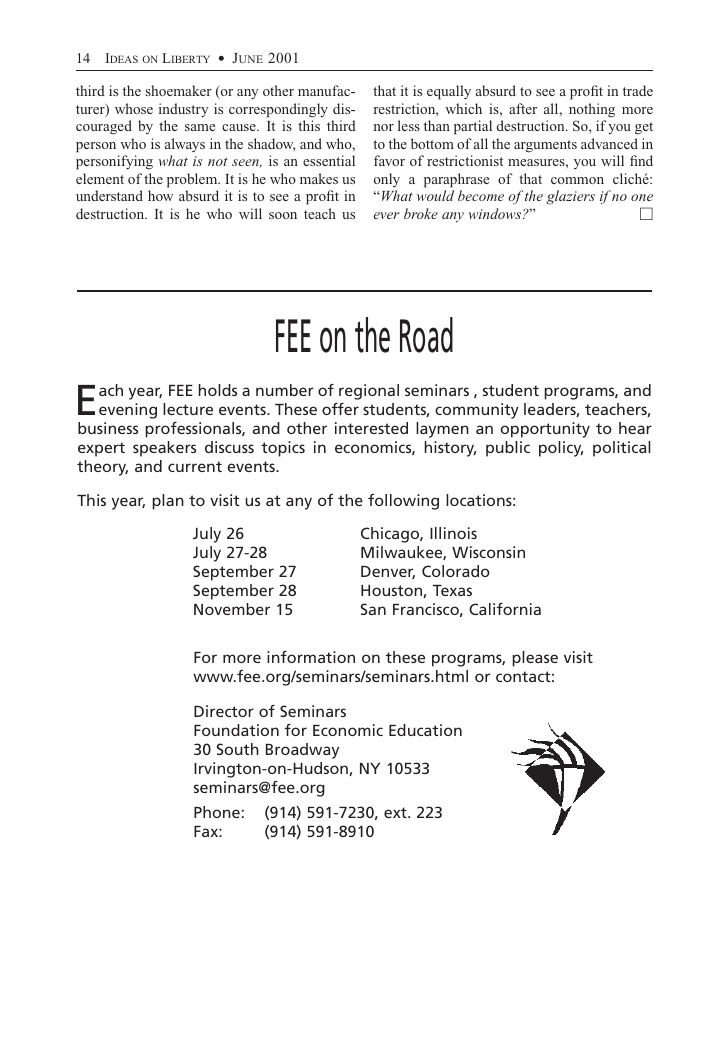BASTIAT
BICENTENNIAL
JUNE 2001
What Is Seen and
What Is Not Seen
by Frédéric Bastiat
In the economic sphere an act, a habit, an
institution, a law produces not only one
effect, but a series of effects. Of these effects,
the first alone is immediate; it appears simul-
taneously with its cause; it is seen. The other
effects emerge only subsequently; they are
not seen; we are fortunate if we foresee them.1
There is only one difference between a bad
economist and a good one: the bad economist
confines himself to the visible effect; the good
economist takes into account both the effect
that can be seen and those effects that must be
foreseen.
Yet this difference is tremendous; for it
almost always happens that when the immedi-
ate consequence is favorable, the later conse-
quences are disastrous, and vice versa.
Whence it follows that the bad economist pur-
sues a small present good that will be fol-
lowed by a great evil to come, while the good
economist pursues a great good to come, at
the risk of a small present evil.
The same thing, of course, is true of health
and morals. Often, the sweeter the first fruit of
a habit, the more bitter are its later fruits: for
example, debauchery, sloth, prodigality.
When a man is impressed by the effect that is
seen and has not yet learned to discern the
effects that are not seen, he indulges in
deplorable habits, not only through natural
inclination, but deliberately.
This excerpt is from the first chapter of Selected
Essays on Political Economy, translated by Seymour
Cain and edited by George B. de Huszar, published
by the Foundation for Economic Education.
This explains man’s necessarily painful
evolution. Ignorance surrounds him at his cra-
dle; therefore, he regulates his acts according
to their first consequences, the only ones that,
in his infancy, he can see. It is only after a
long time that he learns to take account of the
others. Two very different masters teach him
this lesson: experience and foresight. Experi-
ence teaches efficaciously but brutally. It
instructs us in all the effects of an act by mak-
ing us feel them, and we cannot fail to learn
eventually, from having been burned our-
selves, that fire burns. I should prefer, in so
far as possible, to replace this rude teacher
with one more gentle: foresight. For that rea-
son I shall investigate the consequences of
several economic phenomena, contrasting
those that are seen with those that are not
seen.
The Broken Window
Have you ever been witness to the fury of
that solid citizen, James Goodfellow,2 when
his incorrigible son has happened to break a
1. [This pamphlet, published in July 1850, is the last that Bastiat
wrote. It had been promised to the public for more than a year. Its
publication had been delayed because the author had lost the manu-
script when he moved his household from the rue de Choiseul to the
rue d’Alger. After a long and fruitless search, he decided to rewrite
his work entirely, and chose as the principal basis of his demonstra-
tions some speeches recently delivered in the National Assembly.
When this task was finished, he reproached himself with having been
too serious, threw the second manuscript into the fire, and wrote the
one which we reprint.—Editor.]
2. [In French, Jacques Bonhomme, used like “John Bull” in Eng-
lish to represent the practical, responsible, unassuming average
man.—Translator.]
12
�
pane of glass? If you have been present at this
spectacle, certainly you must also have
observed that the onlookers, even if there are
as many as thirty of them, seem with one
accord to offer the unfortunate owner the self-
same consolation: “It’s an ill wind that blows
nobody some good. Such accidents keep
industry going. Everybody has to make a liv-
ing. What would become of the glaziers if no
one ever broke a window?”
Now, this formula of condolence contains a
whole theory that it is a good idea for us to
expose, flagrante delicto, in this very simple
case, since it is exactly the same as that
which, unfortunately, underlies most of our
economic institutions.
Suppose that it will cost six francs to repair
the damage. If you mean that the accident
gives six francs’ worth of encouragement to
the aforesaid industry, I agree. I do not contest
it in any way; your reasoning is correct. The
glazier will come, do his job, receive six
francs, congratulate himself, and bless in his
heart the careless child. That is what is seen.
But if, by way of deduction, you conclude,
as happens only too often, that it is good to
break windows, that it helps to circulate
money, that it results in encouraging industry
in general, I am obliged to cry out: That will
never do! Your theory stops at what is seen. It
does not take account of what is not seen.
It is not seen that, since our citizen has
spent six francs for one thing, he will not be
able to spend them for another. It is not seen
that if he had not had a windowpane to
replace, he would have replaced, for example,
his worn-out shoes or added another book to
his library. In brief, he would have put his six
francs to some use or other for which he will
not now have them.
Let us next consider industry in general.
The window having been broken, the glass
industry gets six francs’ worth of encourage-
ment; that is what is seen.
If the window had not been broken, the
shoe industry (or some other) would have
received six francs’ worth of encouragement;
that is what is not seen.
And if we were to take into consideration
what is not seen, because it is a negative fac-
tor, as well as what is seen, because it is a pos-
13
itive factor, we should understand that there is
no benefit to industry in general or to nation-
al employment as a whole, whether windows
are broken or not broken.
Now let us consider James Goodfellow.
On the first hypothesis, that of the broken
window, he spends six francs and has, neither
more nor less than before, the enjoyment of
one window.
On the second, that in which the accident
did not happen, he would have spent six
francs for new shoes and would have had the
enjoyment of a pair of shoes as well as of a
window.
Now, if James Goodfellow is part of soci-
ety, we must conclude that society, consider-
ing its labors and its enjoyments, has lost the
value of the broken window.
From which, by generalizing, we arrive at
this unexpected conclusion: “Society loses
the value of objects unnecessarily destroyed,”
and at this aphorism, which will make the hair
of the protectionists stand on end: “To break,
to destroy, to dissipate is not to encourage
national employment,” or more briefly:
“Destruction is not profitable.”
What will the Moniteur industriel3 say to
this, or the disciples of the estimable M. de
Saint-Chamans,4 who has calculated with
such precision what industry would gain from
the burning of Paris, because of the houses
that would have to be rebuilt?
I am sorry to upset his ingenious calcula-
tions, especially since their spirit has passed
into our legislation. But I beg him to begin
them again, entering what is not seen in the
ledger beside what is seen.
The reader must apply himself to observe
that there are not only two people, but three,
in the little drama that I have presented. The
one, James Goodfellow, represents the con-
sumer, reduced by destruction to one enjoy-
ment instead of two. The other, under the fig-
ure of the glazier, shows us the producer
whose industry the accident encourages. The
3. [Newspaper of the Committee for the Defense of Domestic
Industry, a protectionist organization.—Translator.]
4. [Auguste, Vicomte de Saint-Chamans (1777–1861), Deputy
and Councillor of State under the Restoration, protectionist and
upholder of the balance of trade. His celebrated stand on the “obsta-
cle” here quoted by Bastiat comes from his Nouvel essai sur la
richesse des nations, 1824. This work was later (1852) incorporated
in his Traité d’économie politique.—Translator.]
�
14 IDEAS ON LIBERTY • JUNE 2001
third is the shoemaker (or any other manufac-
turer) whose industry is correspondingly dis-
couraged by the same cause. It is this third
person who is always in the shadow, and who,
personifying what is not seen, is an essential
element of the problem. It is he who makes us
understand how absurd it is to see a profit in
destruction. It is he who will soon teach us
that it is equally absurd to see a profit in trade
restriction, which is, after all, nothing more
nor less than partial destruction. So, if you get
to the bottom of all the arguments advanced in
favor of restrictionist measures, you will find
only a paraphrase of that common cliché:
“What would become of the glaziers if no one
䡺
ever broke any windows?”
FEE on the Road
Each year, FEE holds a number of regional seminars , student programs, and
evening lecture events. These offer students, community leaders, teachers,
business professionals, and other interested laymen an opportunity to hear
expert speakers discuss topics in economics, history, public policy, political
theory, and current events.
This year, plan to visit us at any of the following locations:
July 26
July 27-28
September 27
September 28
November 15
Chicago, Illinois
Milwaukee, Wisconsin
Denver, Colorado
Houston, Texas
San Francisco, California
For more information on these programs, please visit
www.fee.org/seminars/seminars.html or contact:
Director of Seminars
Foundation for Economic Education
30 South Broadway
Irvington-on-Hudson, NY 10533
seminars@fee.org
Phone:
Fax:
(914) 591-7230, ext. 223
(914) 591-8910
�






 2023年江西萍乡中考道德与法治真题及答案.doc
2023年江西萍乡中考道德与法治真题及答案.doc 2012年重庆南川中考生物真题及答案.doc
2012年重庆南川中考生物真题及答案.doc 2013年江西师范大学地理学综合及文艺理论基础考研真题.doc
2013年江西师范大学地理学综合及文艺理论基础考研真题.doc 2020年四川甘孜小升初语文真题及答案I卷.doc
2020年四川甘孜小升初语文真题及答案I卷.doc 2020年注册岩土工程师专业基础考试真题及答案.doc
2020年注册岩土工程师专业基础考试真题及答案.doc 2023-2024学年福建省厦门市九年级上学期数学月考试题及答案.doc
2023-2024学年福建省厦门市九年级上学期数学月考试题及答案.doc 2021-2022学年辽宁省沈阳市大东区九年级上学期语文期末试题及答案.doc
2021-2022学年辽宁省沈阳市大东区九年级上学期语文期末试题及答案.doc 2022-2023学年北京东城区初三第一学期物理期末试卷及答案.doc
2022-2023学年北京东城区初三第一学期物理期末试卷及答案.doc 2018上半年江西教师资格初中地理学科知识与教学能力真题及答案.doc
2018上半年江西教师资格初中地理学科知识与教学能力真题及答案.doc 2012年河北国家公务员申论考试真题及答案-省级.doc
2012年河北国家公务员申论考试真题及答案-省级.doc 2020-2021学年江苏省扬州市江都区邵樊片九年级上学期数学第一次质量检测试题及答案.doc
2020-2021学年江苏省扬州市江都区邵樊片九年级上学期数学第一次质量检测试题及答案.doc 2022下半年黑龙江教师资格证中学综合素质真题及答案.doc
2022下半年黑龙江教师资格证中学综合素质真题及答案.doc